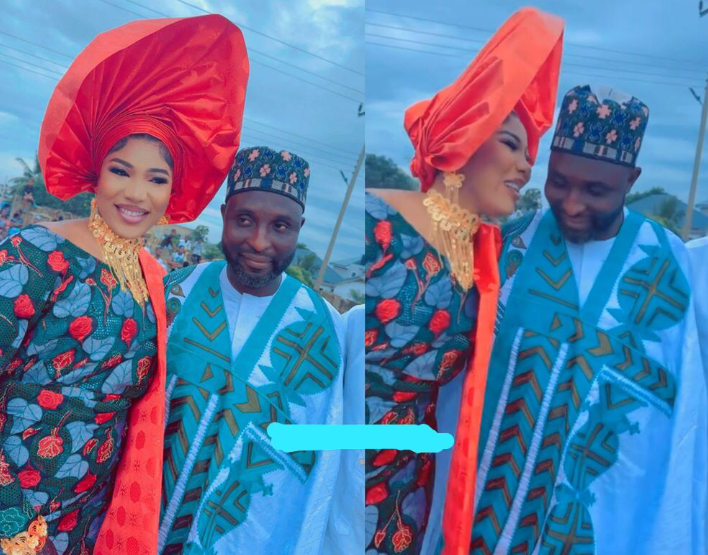
“Alhamdulillah!! Polygamy Won in the End” – Nigerian Man Celebrates as He Marries Second Wife Amid Online Buzz
In a story that has ignited passionate reactions across social media platforms, a Nigerian man has publicly celebrated the success of his decision to marry a second wife, declaring joyfully, “Alhamdulillah!! Polygamy won in the end.” His post, which was shared on X (formerly Twitter) and quickly went viral, came
In a story that has ignited passionate reactions across social media platforms, a Nigerian man has publicly celebrated the success of his decision to marry a second wife, declaring joyfully, “Alhamdulillah!! Polygamy won in the end.” His post, which was shared on X (formerly Twitter) and quickly went viral, came with pictures from the traditional wedding ceremony, featuring the smiling groom standing proudly beside his new bride. The comment section lit up almost instantly, with some hailing his choice and others criticizing it bitterly, adding fuel to Nigeria’s ongoing cultural debate around polygamy, love, and marital values.
The man, whose handle on X is @UmarOfKano, posted the celebratory message alongside a caption that read, “Against all odds, I chose my happiness. She accepted me as her co-wife. My family stood with me. Alhamdulillah!! Polygamy won in the end.” His post included photos of the bride in full traditional attire, his first wife sitting composedly beside them, and a group of family and friends posing proudly at the event. Within hours, the images had been retweeted thousands of times, with the hashtag #PolygamyWon trending among Nigerian users for the rest of the day.
While polygamy is legally permitted in parts of Nigeria under Islamic law and customary traditions, the subject remains a highly sensitive and divisive topic, especially in the age of social media where personal decisions are increasingly placed under the public microscope. For some, Umar’s public display of joy over taking a second wife was a courageous act of cultural pride. For others, it was seen as a tone-deaf and provocative endorsement of patriarchy and emotional injustice.
In an exclusive conversation with a local blog, Umar explained his journey towards polygamy. “It wasn’t an easy decision,” he said. “My first wife and I talked about it for months. I didn’t do this behind her back. She agreed, even though it was hard. But I made sure both women were on board and treated with respect. This is not about lust or carelessness. This is about building a bigger, more united family in line with my faith.”
That explanation, however, did little to calm the waves of criticism that followed. One user wrote, “You talk of unity, but you’re splitting your attention, your resources, your loyalty. You’re hurting your first wife whether she says it or not.” Another chimed in, “This isn’t culture anymore, it’s convenience. Men use religion as an excuse for emotional betrayal.”
Still, supporters of Umar came out in droves to defend him. “He followed Islamic principles. He didn’t cheat. He didn’t deceive. He married her properly. What’s the problem?” one user argued. Another added, “Polygamy isn’t the problem, hypocrisy is. At least this man is open about his choices. Unlike those with side chicks and secret families.”
Notably, Umar’s first wife has remained relatively quiet online, only posting a cryptic status on WhatsApp that read, “Strength isn’t always loud. Sometimes, it’s silent acceptance.” Some interpreted this as resignation, while others praised her for showing grace and dignity in a complicated situation. A few more radical voices, however, questioned the power dynamics that might have influenced her so-called “acceptance,” pointing out how cultural and religious expectations often pressure women to smile through what they truly suffer in silence.
Marriage counselors and relationship experts have since weighed in on the viral event. “Polygamy, like monogamy, requires consent, communication, and compatibility,” said Halima Gambo, a Kano-based marital therapist. “But in many cases, women don’t feel empowered to say no. They say yes to avoid shame, to avoid divorce, to keep the peace. That’s where the issue lies.”
Others have drawn attention to the performative nature of such celebrations. “This was more than a wedding,” said Uche Ogbonna, a sociologist based in Lagos. “It was a public statement. He wanted to prove something—to himself, to society, to other men. That’s why he posted it with such boldness. It’s a form of cultural resistance against modern liberal values that view polygamy as regressive.”
Indeed, the story has sparked broader conversations about gender roles, faith, and modern relationships in Nigeria. With Western ideals increasingly influencing the youth, the clash between tradition and modernity continues to shape how marriage is viewed, especially in urban areas. For some, Umar is a symbol of unapologetic traditional masculinity; for others, he’s a reminder of the long journey still ahead for women’s emotional equity in marriage.
The national debate surrounding Umar’s second marriage also raised questions about the role of social media in private life. Some critics argued that posting such an announcement online was an intentional provocation. “It’s one thing to live your life. It’s another to post it online knowing it will trigger people. That’s attention-seeking, not cultural pride,” said a user named AishaBlaq.
In contrast, Umar remains unbothered. “People will always talk. They talked when I married my first wife. They talked when I started my business. They will talk now. What matters is that I’m at peace, my wives are at peace, and my faith supports my decision,” he said.
For now, the man who proudly declared “Alhamdulillah!! Polygamy won in the end” stands at the center of Nigeria’s latest internet storm—a man whose personal milestone has reignited a national conversation. Whether he is seen as a hero, a villain, or just another man exercising his rights, one thing is clear: his story is far from ordinary, and the ripples of his choice are likely to linger in the public discourse for weeks to come.
As social media continues to blur the lines between the personal and the political, Umar’s wedding is a stark reminder that marriage—once a deeply private affair—has become a stage on which deeper societal battles are fought. In this case, it was not just a union of two people but a public referendum on culture, gender, and what love means in 2025 Nigeria.
Share this post
Related Posts

“Money Is Just a Plus” – Sophia Egbueje Sparks Conversation on What Women Should Truly Value in Men
In a world where wealth and material possessions often dominate conversations around relationships, Nigerian socialite...

Holy Ink: Clergyman Kingsley Okonkwo Sparks Heated Debate After Revealing Arm Tattoo
Clergyman and relationship coach Kingsley Okonkwo has sent social media into a frenzy after unveiling...

BREAKING: Wike Bans Mobile Phones for AGIS Staff After Viral Clash with Naval Officer
Federal Capital Territory (FCT) Minister Nyesom Wike has issued a total ban on the use...